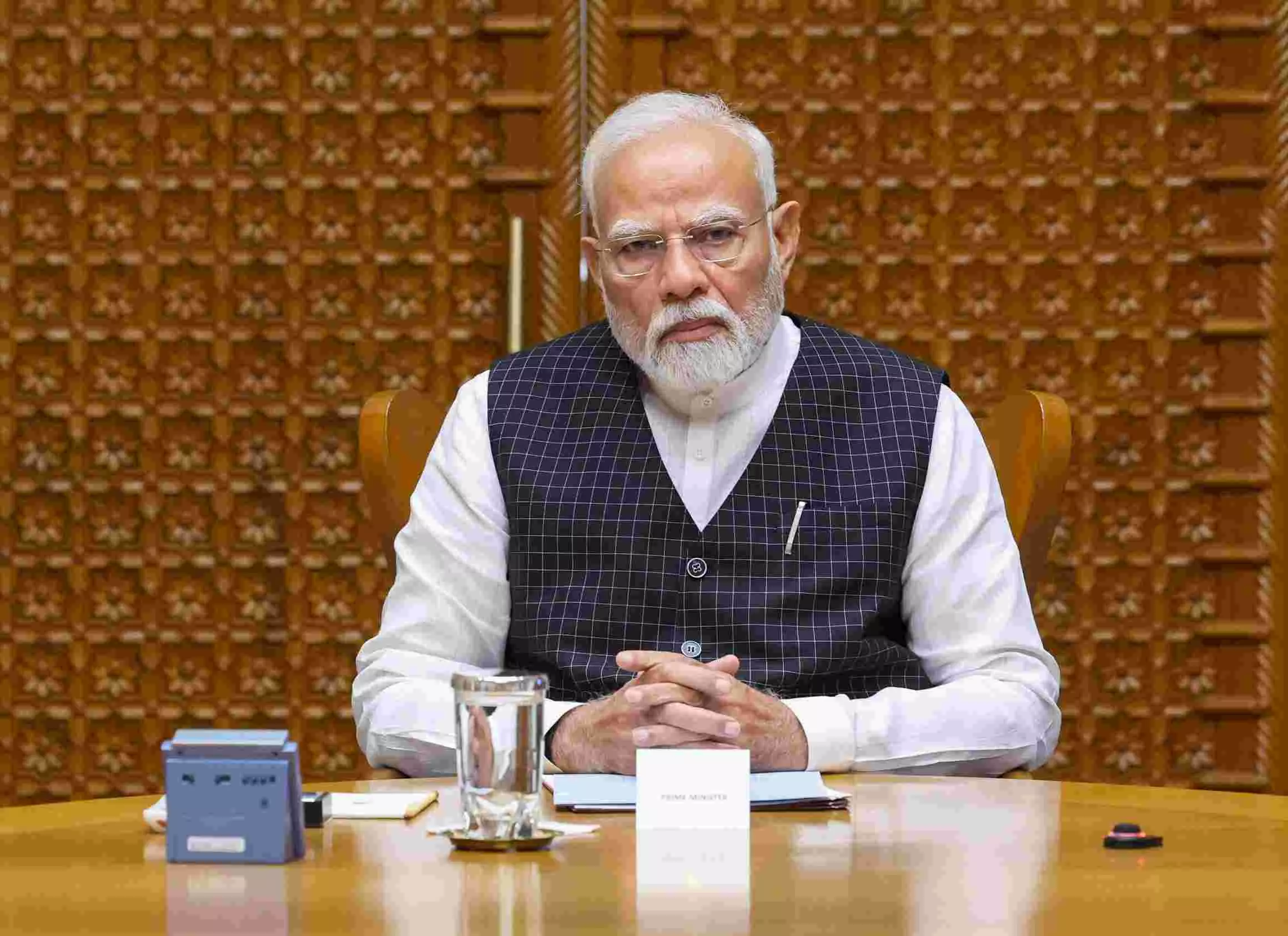
- Home
- India
- World
- Premium
- THE FEDERAL SPECIAL
- Analysis
- States
- Perspective
- Videos
- Sports
- Education
- Entertainment
- Elections
- Features
- Health
- Business
- Series
- In memoriam: Sheikh Mujibur Rahman
- Bishnoi's Men
- NEET TANGLE
- Economy Series
- Earth Day
- Kashmir’s Frozen Turbulence
- India@75
- The legend of Ramjanmabhoomi
- Liberalisation@30
- How to tame a dragon
- Celebrating biodiversity
- Farm Matters
- 50 days of solitude
- Bringing Migrants Home
- Budget 2020
- Jharkhand Votes
- The Federal Investigates
- The Federal Impact
- Vanishing Sand
- Gandhi @ 150
- Andhra Today
- Field report
- Operation Gulmarg
- Pandemic @1 Mn in India
- The Federal Year-End
- The Zero Year
- Science
- Brand studio
- Newsletter
- Elections 2024
- Events
- Home
- IndiaIndia
- World
- Analysis
- StatesStates
- PerspectivePerspective
- VideosVideos
- Sports
- Education
- Entertainment
- ElectionsElections
- Features
- Health
- BusinessBusiness
- Premium
- Loading...
Premium - Events

Modi's challenge is to come up with an effective retaliatory strike; he also must ensure that any retaliatory steps do not trigger a smear campaign against Muslims
After the extremely despicable terrorist strike in Pahalgam, Prime Minister Narendra Modi faces his sternest challenge – in coming up and putting into effect a kinetic attack on the perpetrators of the terror strike and those who his government believes to be instrumental in setting up and masterminding the strike force.
This response must be such that the targetted group or entity considers that any retaliatory move on their part would yield little dividend and cause further damage to resources and image.
Alpha male image
Besides the test of mettle and strategy, Modi also faces the arduous task of maintaining his image of the alpha male, the man who brooks no challenge to his hegemony and who does not get daunted, however daunting the task at hand may be.
The Indian government has already announced a slew of diplomatic measures, but in the perpetually raging ecosystem of its fanatically driven supporters, all these will be seen as of little value.
For far too long, Modi has been projected as an individual jo ghar mein ghus kar maarte hain (one who enters the ‘enemies’ portals and strikes). Anything which cannot be pitched over the ruling party’s humungous publicity machinery, as an act in that realm, will be seen by his camp followers as an unsatisfactory response.
Also read: Is Kashmir really terror-free as Centre claims? Pahalgam attack a reality check
Ample retaliation
But, when it comes to a security response to the strike, Modi is somewhat hamstrung by having made two previous offensives against Pakistan-based terrorists – first after the Uri attack in September 2016 and the second in February 2019 after the attack in Pulwama on a convoy carrying security personnel.
Modi’s response this time is a shade constrained by these two previous retaliatory actions by Indian defence forces, because in the index of severity, the second attack was far more outrageous. As a result, the response to Pulwama was several notches higher than what was rhetorically called a 'surgical strike' by Modi and his political bandwagon.
Undoubtedly, the terrorist strike at Pahalgam’s ‘mini-Switzerland’ is far more macabre and ghastly. Consequently, the Indian response will have to necessarily appear more ‘severe’ to the political constituency that Modi cultivates and caters to, if he wishes to retain their support. Taking adequate action is not enough; it must be seen as being ‘ample’ retaliation.
But, in the current global situation, wracked by two continuing wars in different theatres, Modi will have to weather far greater calls for restraint than what he may have had to overcome in 2016 and 2019.
Intelligence, security failure
He will also have to tackle two other matters. The first obviously is what has not been raked up in the mainstream media in the immediate aftermath of the Pahalgam attack – that of complete intelligence and security failure.
It clearly appears that either the intelligence agencies did not provide adequate warning regarding the imminence of such a dastardly strike, or such a forewarning was ignored by security forces and others within the Executive.
Over almost past 11 years that Modi has been in government, support for the regime has often been bolstered by false narratives, for instance, the claim that ‘prestige’ and ‘respect’ for Indians and the Indian passport have been greatly enhanced in the course of Modi’s tenure.
The truth, however, is that India dropped to the 148th position this year out of a global list of 199 countries, according to the Nomad Capitalist Passport Index 2025. Numerous other instances can be cited, but that is not the primary purpose at this moment.
Also read: Red line crossed, India weighs responses to Pahalgam terror attack
It is a truism that the most dangerous creators of false narratives are those who begin to believe in their web of untruth. It is true that elections were successfully held for the first time in Jammu and Kashmir after the abrogation of Article 370, but the prevailing security scenario in the Union Territory is far from normal.
Hawk’s eye on Pakistan
It may be politically necessary for the current regime to declare that terrorism in the former state of Jammu and Kashmir was solely due to Article 370 and that 'Naya Kashmir' is flourishing, but to start believing in this and not providing basic security cover to tourists flocking to places like the meadow in Baisaran is little but blasphemy.
With India’s relationship with Pakistan showing little improvement, it is necessary to keep a hawk’s eye on developments there and closely monitor statements made by officials and political leaders in key positions.
Also read: 'Go, tell Modi’: Woman gets chilling message after husband killed in Pahalgam
Indian intelligence agencies and others in the security establishment must be questioned if they did not flag concerns or warning signs in the aftermath of the hijack of the Jaffar Express train in Balochistan in March.
It also would not have taken much effort to keep track of Pakistan’s military establishment accusing India of aiding terrorist groups in the country.
Lack of preventive steps
Importantly, Vivek Katju, retired Indian Foreign Service officer, who was India’s ambassador to Afghanistan and Myanmar, besides holding several other important positions, specifically warned in an article that it was “possible that the Pakistan army will attempt to sponsor a terrorist event in India within the foreseeable future.”
He also suggested various lines of action to ward off this threat. It is also likely that a similar view may have been held by other security and diplomatic experts, some of whom may have been consulted by the Indian security and intelligence brass.
Yet, preventive steps like beefing up security for unarmed tourists were not taken. Clearly, complacency ruled for having tided past the polls in the state and also due to witnessing Chief Minister Omar Abdullah sending signals of cooperating with the Centre on specific matters.
Polarising effects of attack
The second issue that Modi will have to tackle is the extent to which the episode can be allowed to polarise society across India based on religious identity.
Already, anecdotal evidence surfaced on several social media networks of residential societies in various metropolitan cities, regarding demands for disallowing entry to Muslim maids and other helping hands are being made.
The problem for Modi is that although he secured political power in 2014 courtesy a litany of promises that promised ache din and badlao (good tidings and change), jobs and development, his regime has been sustained over the decade plus period essentially through a cocktail of hate and prejudice directed at the religious minorities, essentially Muslims and Christians.
In recent months, the RSS leadership, as well as the BJP brass, has tried to rein in the more ‘extreme’ views within the ranks. Sarsanghchalak Mohan Bhagwat, who earlier made the famous statement that it was “not necessary” to look for a temple underneath every mosque, recently made several calls for restraint.
Likewise, the BJP too has asked its members, most notably Nishikant Dubey, to tone down their stridency on a wide variety of issues.
Bigger challenge
The challenge for Modi would be to ensure that any retaliatory action on the part of the government should not provide an opportunity to the more aggressive Hindutva votaries to press on the pedal and mount a widespread hate and smear campaign against Muslims.
This might appear easier than it actually is because for long, the leadership of the party, too, has projected Pakistan and Indian Muslims as being synonyms of one another.
Quite clearly, the coming days will be a pointer to the Indian government’s strategy following dastardly terrorist acts against it and the people, as well as whether its supporters modify their rhetorical campaign to either tone it down or escalate the vituperative drive against the religious minorities.
(The Federal seeks to present views and opinions from all sides of the spectrum. The information, ideas or opinions in the articles are of the author and do not necessarily reflect the views of The Federal)


